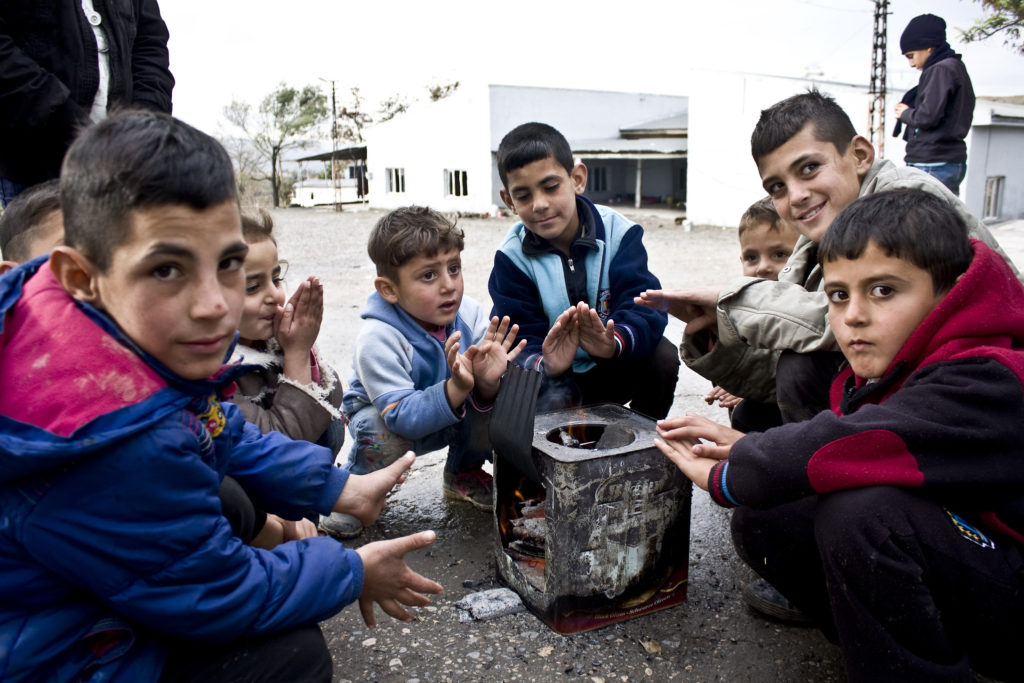Published: 05/25/2022

Photo credit: Caroline Gluck/EU/ECHO, FLICKR
By Jamie Hansen, Communications Manager at the Stanford Center for Innovation in Global Health
When investigating atrocities committed by terrorist organizations like ISIL in Iraq, investigators rely on the testimony of victims to bring the truth to light and ensure justice.
But the process of investigating these crimes can perpetuate more harm and trauma if not conducted in a way that is culturally appropriate and sensitive to the victims.
To protect and center the victims’ rights, dignity, and agency during the investigation of war crimes, Stanford University’s Human Rights in Trauma Mental Health Program recently partnered with UNITAD (the United Nations investigative team tasked with holding ISIL, or Da’Esh, accountable for its crimes) to develop an unprecedented Trauma-Informed Investigations Field Guide.
The Stanford and the UNITAD team based in Iraq together launched the field guide in 2021. It outlines the role of trauma-informed approaches to working with witnesses and survivors and is now accompanied by a full reference manual that was just published this spring.
“Some of this work has been done before, but some of it is pretty new, progressive, unusual, and, I think, fantastic,” said Stanford Global Health Faculty Fellow Daryn Reicherter in an April 22 talk on building a trauma-informed approach to the investigation of war crimes, hosted by Stanford’s Center for Human Rights and International Justice and Abbasi Program in Islamic Studies. “We’ve gone a step farther to develop and build capacity to support survivors of ISIS.”
Reicherter, director of the Human Rights in Trauma Mental Health Program and clinical professor in Stanford’s Department of Psychiatry and Behavioral Sciences, moderated the recent talk highlighting this work, which featured United Nations clinical psychologists Nenna Ndukwe, Sarah Alcalay, and Chinedu Ezemokwe.
Reicherter and his UN colleagues believe their guide represents a significant step forward in helping legal advocates, investigators, first responders, and mental health practitioners understand trauma related to human rights abuses and equipping them with better training and support to work with survivors — while also guiding justice systems’ approach to addressing atrocities in a way that acknowledges trauma’s lasting effects on individuals, families, and communities.
Considering trauma offers multiple benefits, they say — both to the survivors and to the justice process, resulting in more accurate information and a greater likelihood of bringing perpetrators to justice.
During the UNITAD investigation in Iraq, investigators sought to build rapport through respecting common effects of trauma, minimizing activities that triggered trauma, and taking into account the impact of trauma on cognitive functioning, said Alcalay. For instance, she said, many who endure extreme psychological stress record memory differently: It can be more fragmented and focused primarily on the specific details of the trauma. Likewise, children often remember and relate traumatic events differently than adults. Knowing this can help investigators approach questioning more strategically — while also avoiding questions that might create new trauma for the victims.
“Investigators are more likely to get accurate and correct information if the witness is in a safe and protected environment,” she said.
The guide also outlines how to safeguard the mental health of those working with victims, said Ezemokwe. Investigators, translators, and others can suffer secondary trauma from bearing witness to the victim’s stories — and in many cases may be survivors themselves.
Beyond ensuring the trauma mental health elements of the investigation, the team also coordinated health care efforts within Iraq and also built capacity by training local NGOs, so that once the mission was complete, local providers were equipped with resources to recognize and treat trauma in ISIL survivors.
The effort in Iraq also went beyond the investigation itself to help heal the community: The UNITAD team supported the government in conducting mass grave excavations, returning remains, and holding commemorative events.
“In the past, witnesses were seen as a tool. Later there came the realization that we need to be looking out for them in the process and in the outcome,” said Jessie Brunner, associate director of strategy and program development at the Center for Human Rights and International Justice.
Reicherter added that war crimes tribunals have traditionally been approached as strictly-information gathering processes, where mental health impacts were largely ignored. “Yet, it doesn’t take a psychologist to know that psychology is part of human rights violations. Human rights violations are what they are because they are offensive to the psyche,” he said.
The team has now created new versions of the guides that can be used in United Nations investigations in other settings around the world. The UNITAD/Stanford writing teams have edited the document to be a general guide which could work for any investigation and almost any context. /As Stanford engages other investigations they will use the blueprint of the general guide and then work with local teams to fill in the on-the-ground data to make the guide tailored to the situation for investigations we will plan to collaborate with next.
“We hope that this can be a gold standard or at least a starting point that other justice mechanisms can use,” Reichterter said.
Additional Resources